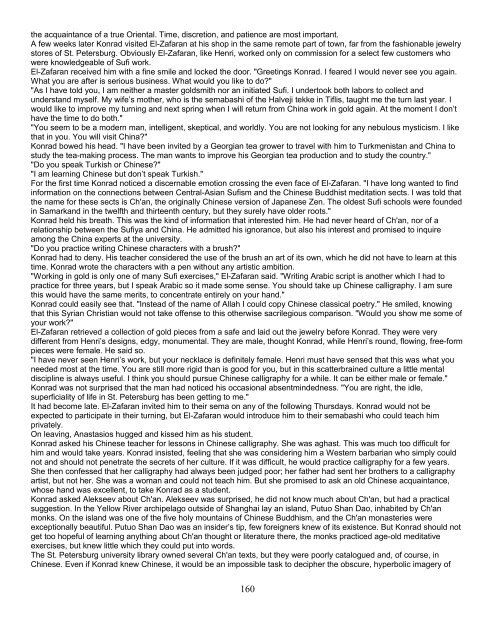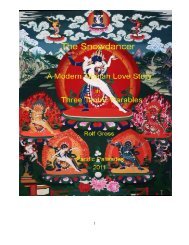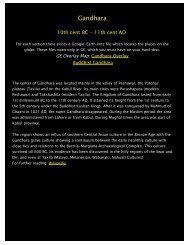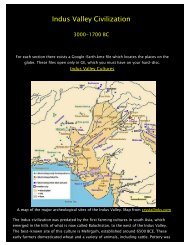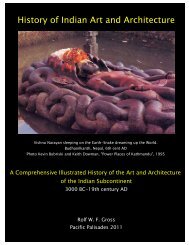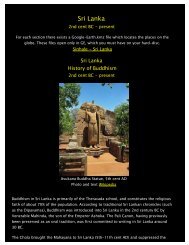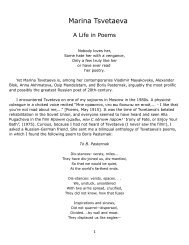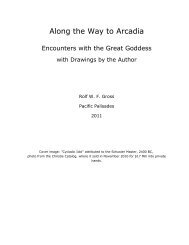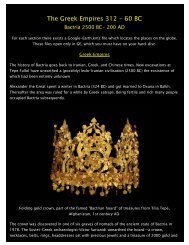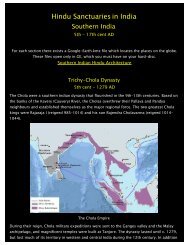the acquaintance of a true Oriental. Time, discretion, <strong>and</strong> patience are most important.A few weeks later <strong>Konrad</strong> visited El-Zafaran at his shop in the same remote part of town, far from the fashionable jewelrystores of St. Petersburg. Obviously El-Zafaran, like Henri, worked only on commission for a select few customers whowere knowledgeable of Sufi work.El-Zafaran received him with a fine smile <strong>and</strong> locked the door. "Greetings <strong>Konrad</strong>. I feared I would never see you again.What you are after is serious business. What would you like to do?""As I have told you, I am neither a master goldsmith nor an initiated Sufi. I undertook both labors to collect <strong>and</strong>underst<strong>and</strong> myself. My wife’s mother, who is the semabashi of the Halveji tekke in Tiflis, taught me the turn last year. Iwould like to improve my turning <strong>and</strong> next spring when I will return from China work in gold again. At the moment I don’thave the time to do both.""You seem to be a modern man, intelligent, skeptical, <strong>and</strong> worldly. You are not looking for any nebulous mysticism. I likethat in you. You will visit China?"<strong>Konrad</strong> bowed his head. "I have been invited by a Georgian tea grower to travel with him to Turkmenistan <strong>and</strong> China tostudy the tea-making process. The man wants to improve his Georgian tea production <strong>and</strong> to study the country.""Do you speak Turkish or Chinese?""I am learning Chinese but don’t speak Turkish."For the first time <strong>Konrad</strong> noticed a discernable emotion crossing the even face of El-Zafaran. "I have long wanted to findinformation on the connections between Central-Asian Sufism <strong>and</strong> the Chinese Buddhist meditation sects. I was told thatthe name for these sects is Ch'an, the originally Chinese version of Japanese Zen. The oldest Sufi schools were foundedin Samark<strong>and</strong> in the twelfth <strong>and</strong> thirteenth century, but they surely have older roots."<strong>Konrad</strong> held his breath. This was the kind of information that interested him. He had never heard of Ch'an, nor of arelationship between the Sufiya <strong>and</strong> China. He admitted his ignorance, but also his interest <strong>and</strong> promised to inquireamong the China experts at the university."Do you practice writing Chinese characters with a brush?"<strong>Konrad</strong> had to deny. His teacher considered the use of the brush an art of its own, which he did not have to learn at thistime. <strong>Konrad</strong> wrote the characters with a pen without any artistic ambition."Working in gold is only one of many Sufi exercises," El-Zafaran said. "Writing Arabic script is another which I had topractice for three years, but I speak Arabic so it made some sense. You should take up Chinese calligraphy. I am surethis would have the same merits, to concentrate entirely on your h<strong>and</strong>."<strong>Konrad</strong> could easily see that. "Instead of the name of Allah I could copy Chinese classical poetry." He smiled, knowingthat this Syrian Christian would not take offense to this otherwise sacrilegious comparison. "Would you show me some ofyour work?"El-Zafaran retrieved a collection of gold pieces from a safe <strong>and</strong> laid out the jewelry before <strong>Konrad</strong>. They were verydifferent from Henri’s designs, edgy, monumental. They are male, thought <strong>Konrad</strong>, while Henri’s round, flowing, free-formpieces were female. He said so."I have never seen Henri’s work, but your necklace is definitely female. Henri must have sensed that this was what youneeded most at the time. You are still more rigid than is good for you, but in this scatterbrained culture a little mentaldiscipline is always useful. I think you should pursue Chinese calligraphy for a while. It can be either male or female."<strong>Konrad</strong> was not surprised that the man had noticed his occasional absentmindedness. "You are right, the idle,superficiality of life in St. Petersburg has been getting to me."It had become late. El-Zafaran invited him to their sema on any of the following Thursdays. <strong>Konrad</strong> would not beexpected to participate in their turning, but El-Zafaran would introduce him to their semabashi who could teach himprivately.On leaving, Anastasios hugged <strong>and</strong> kissed him as his student.<strong>Konrad</strong> asked his Chinese teacher for lessons in Chinese calligraphy. She was aghast. This was much too difficult forhim <strong>and</strong> would take years. <strong>Konrad</strong> insisted, feeling that she was considering him a Western barbarian who simply couldnot <strong>and</strong> should not penetrate the secrets of her culture. If it was difficult, he would practice calligraphy for a few years.She then confessed that her calligraphy had always been judged poor; her father had sent her brothers to a calligraphyartist, but not her. She was a woman <strong>and</strong> could not teach him. But she promised to ask an old Chinese acquaintance,whose h<strong>and</strong> was excellent, to take <strong>Konrad</strong> as a student.<strong>Konrad</strong> asked Alekseev about Ch'an. Alekseev was surprised, he did not know much about Ch'an, but had a practicalsuggestion. In the Yellow River archipelago outside of Shanghai lay an isl<strong>and</strong>, Putuo Shan Dao, inhabited by Ch'anmonks. On the isl<strong>and</strong> was one of the five holy mountains of Chinese Buddhism, <strong>and</strong> the Ch'an monasteries wereexceptionally beautiful. Putuo Shan Dao was an insider’s tip, few foreigners knew of its existence. But <strong>Konrad</strong> should notget too hopeful of learning anything about Ch'an thought or literature there, the monks practiced age-old meditativeexercises, but knew little which they could put into words.The St. Petersburg university library owned several Ch'an texts, but they were poorly catalogued <strong>and</strong>, of course, inChinese. Even if <strong>Konrad</strong> knew Chinese, it would be an impossible task to decipher the obscure, hyperbolic imagery of160
these texts."However, Ch'an is the most typically Chinese variant of Buddhism, laconic, ascetic, <strong>and</strong> dedicated to radically abstractmeditative exercises, an attempt to overcome the Indo-European inclination to intellectually analyze fundamentalreligious insights. Ch'an claims to be the fastest meditative exercise to reach nirvana. I have no experience with easternmeditation exercises <strong>and</strong> cannot vouch for this claim."<strong>Konrad</strong>’s Chinese teacher finally introduced him to a highly cultivated sixty-year-old Chinese gentleman who, thoughalmost offensively disinterested in <strong>Konrad</strong>, promised to teach him calligraphy. Obviously the man did not believe <strong>Konrad</strong>would last long, <strong>and</strong> offered to teach him strictly as a favor to <strong>Konrad</strong>’s Chinese teacher.The man, Professor Li, or laoshi Li, as his students addressed him, gave him a long Chinese brush <strong>and</strong> an ink-stone <strong>and</strong>first taught him how to rub a black sooty substance on the stone with water into a smooth ink. Then he had to practiceteasing the brush into a fine point <strong>and</strong> holding it in the right way. Laoshi Li was meticulous. No two right ways of holdingthat twenty-centimeter-long bamboo stick existed. Next, <strong>Konrad</strong> spent two weeks practicing various strokes on largepieces of newspaper. It was not easy, but finally <strong>Konrad</strong> met with Li’s approval.Li never smiled <strong>and</strong> never made an encouraging remark. He signaled his satisfaction by giving <strong>Konrad</strong> a new sheet onwhich to practice. One day Li looked <strong>Konrad</strong> in the eye, he normally avoided all eye contact, <strong>and</strong> said,"Now you can prove your mettle by drawing the character ling, meaning nothingness, the Void. It looks the same as aWestern O. It is the only circular stroke in Chinese, <strong>and</strong> drawing it is one of the fundamental Ch'an exercises."<strong>Konrad</strong> perked his ears. With one move of his wrist, his teacher drew a large, perfectly round circle that began with thefull brush <strong>and</strong> ended in the thinnest lift-off just before closing the figure. Li’s wrist control was uncanny, <strong>and</strong>, of course,<strong>Konrad</strong> made a fool of himself trying to emulate him.This was the first time Li smiled. "It is a concentration exercise that will take you months to learn. Keep on trying toperfect that stroke while you practice other characters. When you think you have mastered the ‘art of ling’ show it to me.Then you might become my student."One simple brush stroke instead of a hundred words was sufficient to be accepted as a Ch'an student.Li considered the ling exercises a bonus after hours of hard work, "to limber up your wrist." Li made up sheet after sheetof characters that <strong>Konrad</strong> had to practice. He had intimated that he would teach him first a simple, easily readable style.Later he might learn a individualized h<strong>and</strong>. Li showed <strong>Konrad</strong> some scrolls painted in a flowing cursive style of fleeting,most feminine strokes that looked very elegant but were nearly unreadable. Calligraphy was the essence of Chinese art.The ling exercises remained a most trying task—more daunting than the turn, which the semabashi of El-Zafaran’s tekketaught him once a week.<strong>Konrad</strong> worked into the small hours of the night at his Chinese exercises. Alex<strong>and</strong>ra soon felt neglected. She had to getup at six to cope with her many obligations during the day. They barely saw each other at breakfast. Needing her sleep,Alex<strong>and</strong>ra moved out of their common bedroom into the guestroom. Her deserting him, as he saw it, increased thetensions between them. Almost daily they had smaller <strong>and</strong> larger arguments about trivialities, although both knew, that ahurting word would forever be remembered while good deeds had to be repeated again <strong>and</strong> again not to be forgotten.On one such occasion <strong>Konrad</strong> accused Alex<strong>and</strong>ra of always pretending to know better."Better than what or who?" she objected. "I may know a few things which you don’t, but when it gets to the detail, it’s youwho knows everything better than I. The problem is that you are irritated that I spontaneously voice what moves me,instead of burying my worries internally as you do. Unfortunately I am not like my mother, who spent all her life buildingup her husb<strong>and</strong>.""Sometimes I feel," mumbled <strong>Konrad</strong>, "that it would be better if you would hold your tongue more often instead of tellingthe whole world what you think is the truth."Alex<strong>and</strong>ra struck her husb<strong>and</strong> from her mind. She did not have the time to concern herself with his emotional problems,though she could not avoid being constantly physically reminded of <strong>Konrad</strong>’s dark mood. She devoted herself to herpatients, among whom there now were also a few difficult emotional cases. Alex<strong>and</strong>ra had become interested in thepsychological problems of people, because she suspected that they were often the precursors of serious systemic <strong>and</strong>chronic diseases such as cancer, asthma, <strong>and</strong> arthritis.During this restless time Vladimir brought her the manuscript of his pornographic novel. Alex<strong>and</strong>ra was not eager to readit.Vladimir’s "opus" had a title now: The Last Princess of Svaneti. It was written in the first person. Alex<strong>and</strong>ra often hadtrouble deciding whether it was the voice of its heroine, Thamila, or that of Nana, the pseudonymous author.I was born in the mountains of Svaneti at the castle of my father, Prince David Gurjani. Surrounded by the icy peaks ofUshba, Leila, <strong>and</strong> Elbrus, among meadows full of wildflowers in spring, our herds of sheep <strong>and</strong> cattle in summer <strong>and</strong> thefierce cold of winter I grew up an innocent, protected maiden more attuned to horses <strong>and</strong> animals than to people.Oh, Svaneti, the l<strong>and</strong> of towers <strong>and</strong> old churches how I miss you now that I am condemned to live in this big Russiancity…It went on like this for a while, shallow <strong>and</strong> predictable, the heroine reminiscing about her childhood in well-worn clichés.Thamila developed into a wild <strong>and</strong> daring horsewoman, her father doted on her, mother was conservative <strong>and</strong> severe,161
- Page 3 and 4:
Table of Contents1. My Grandfather'
- Page 5 and 6:
1.My Grandfather's Watch among the
- Page 7 and 8:
ditch beside the road.Mother was tr
- Page 9 and 10:
Deep snow still covered Djvari Pass
- Page 11 and 12:
"But you know nothing about how to
- Page 13 and 14:
newborn baby! You won’t need a ba
- Page 15 and 16:
Dadiani bent over the table, reache
- Page 17 and 18:
Autumn had come to Georgia, and it
- Page 19 and 20:
"Gespenstisch!" whispered Mouravi t
- Page 21 and 22:
Finally, depressed by his inability
- Page 23 and 24:
They slowly rode up the hill north
- Page 25 and 26:
On their way back to the Lavra Alex
- Page 27 and 28:
Blushing like a young girl, she gav
- Page 29 and 30:
Alexandra bowed deeply to a middle-
- Page 31 and 32:
All applauded and Ilia made a small
- Page 33 and 34:
She had done her hair up in a new w
- Page 35 and 36:
ape her. But then he must die, and
- Page 37 and 38:
a rear door when she entered.If Per
- Page 39 and 40:
Alexandra went purple with embarras
- Page 41 and 42:
The smell of roasting lamb wafted t
- Page 43 and 44:
Konrad quietly sat back. To his gre
- Page 45 and 46:
The tall, dark-haired woman began w
- Page 47 and 48:
She kissed him."Maybe you dream of
- Page 49 and 50:
14.Tuscany - the Wolfsons' House in
- Page 51 and 52:
ut are, unjustly, much more famous.
- Page 53 and 54:
Alexandra had fallen into melanchol
- Page 55 and 56:
She kissed him tenderly. "Niko, I a
- Page 57 and 58:
obligations, and she, ever since th
- Page 59 and 60:
months, was flooded with the diffus
- Page 61 and 62:
could they be aroused into communal
- Page 63 and 64:
19.An unexpected encounter with Vla
- Page 65 and 66:
chauffeur drop me at the station ju
- Page 67 and 68:
She described her sensation of flyi
- Page 69 and 70:
sky a thin, transparent blue. Imbed
- Page 71 and 72:
interest in Theosophy."Marti shrugg
- Page 73 and 74:
to?Mother had never mentioned any d
- Page 75 and 76:
"Ah, of course, of course, ‘Eine
- Page 77 and 78:
Konrad agreed that this sounded mor
- Page 79 and 80:
patriarchal oak and smiled, a littl
- Page 81 and 82:
have a similar situation in our vil
- Page 83 and 84:
Alexandra disagreed. "Most abortive
- Page 85 and 86:
a limited edition, hand-screened ma
- Page 87 and 88:
Alexandra touched her necklace and
- Page 89 and 90:
close!"She had hugged him, tears ru
- Page 91 and 92:
The others came lumbering up the st
- Page 93 and 94:
urden the heart with this task, whi
- Page 95 and 96:
the colors mixed and changed depend
- Page 97 and 98:
28.Kandinsky's suprising confession
- Page 99 and 100:
With kisses Alexandra removed the v
- Page 101 and 102:
He knelt, removed her knee and leg
- Page 103 and 104:
Joachim viewed Konrad with sympathe
- Page 105 and 106:
The rumbling continued at regular i
- Page 107 and 108:
Russia."She picked up a piece of br
- Page 109 and 110: conservative pessimism, demanded th
- Page 111 and 112: preventative method and taking it e
- Page 113 and 114: new provocation in modern music and
- Page 115 and 116: exhausted the Renaissance idea of b
- Page 117 and 118: creative clairvoyance, and her shar
- Page 119 and 120: Left to herself, Alexandra, awed, w
- Page 121 and 122: public. She fended off the fuzzy wo
- Page 123 and 124: ailways on strike. The strike had t
- Page 125 and 126: Grandfather was very sad when he fo
- Page 127 and 128: and put on his coat and shoes, he r
- Page 129 and 130: Alexandra not in the mood to give V
- Page 131 and 132: crowd of the fashionable and the ma
- Page 133 and 134: established tradition with some mil
- Page 135 and 136: 42.Uncle Muravi's Benz, Tiflis1907"
- Page 137 and 138: equisitioned a locomotive to take t
- Page 139 and 140: meaningless rituals. That may be on
- Page 141 and 142: lacking. I like this man, and at th
- Page 143 and 144: are suitably ambiguous."45.The Dadi
- Page 145 and 146: think of Munich or something else p
- Page 147 and 148: He showed them the room where they
- Page 149 and 150: death."Alexandra was more intereste
- Page 151 and 152: they fought over the offering. The
- Page 153 and 154: flew off cawing.Claudia grabbed Ale
- Page 155 and 156: Together they were hedging out a pl
- Page 157 and 158: the right of women to own their bod
- Page 159: The Chinese wife of a sinologist at
- Page 163 and 164: times, but moved back together agai
- Page 165 and 166: survived the Bolsheviks, the Fascis
- Page 167 and 168: physically overwhelm her. Despite h
- Page 169 and 170: Konrad picked up Alexandra at the t
- Page 171 and 172: Abruptly her vision had narrowed, a
- Page 173 and 174: the Kwadjagani, the Masters of Wisd
- Page 175 and 176: somewhat, his back was still bent,
- Page 177 and 178: century. The characteristic Chinese
- Page 179 and 180: Alexandra was relieved and happy, a
- Page 181 and 182: subconscious past her observant min
- Page 183 and 184: Dahl leaned back in surprise. "This
- Page 185 and 186: visions reappear. Entire armies mar
- Page 187 and 188: "This method is not easy, I have ne
- Page 189 and 190: He had started with representationa
- Page 191 and 192: His hair had turned completely whit
- Page 193 and 194: Overnight the mood in St. Petersbur
- Page 195 and 196: daughter. His wife had left him no
- Page 197 and 198: which was presented to him—with a
- Page 199 and 200: "From the soldiers whom I took care
- Page 201 and 202: He watched Alexandra’s doubting m
- Page 203 and 204: lond, bony girl whose gray eyes loo
- Page 205 and 206: call it intellectual humanism. It d
- Page 207 and 208: time I asked this question I had me
- Page 209 and 210: "I spent most of the winter of 1918
- Page 211 and 212:
We buried him in the cemetery at G
- Page 213 and 214:
ways. Corruption became the way of
- Page 215 and 216:
68.A Concert in Kreuth - Eliso1989I
- Page 217 and 218:
Eliso listened with increasing fasc


